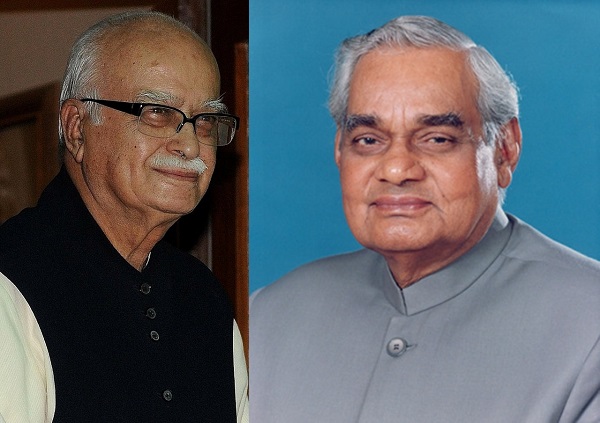Lucknow, (Asian independent) The BJP of today is not the BJP of yesterday. The party is now ideologically sharper, more focussed and more aggressive.
The BJP nurtured by the trio of former Prime Minister late Atal Bihari Vajpayee, L.K. Advani and Murli Manohar Joshi was soft, approachable, amiable and also accepting and forgiving.
Even its hardest critics agree that the ‘old’ BJP was people-friendly and sensitive.
The neo-Hindutva being practiced by the new BJP, particularly in Uttar Pradesh which has been its nursery, is not even a shadow of the Hindutva of Vajpayee era that was mild and malleable.
A veteran BJP leader and multi-term ex-MLA, who spoke to IANS on condition of anonymity, said, “That was the BJP that endeared itself even to those who did not believe in its ideology. I was active at the height of the Ayodhya movement, but we never cracked down on our detractors. There was dialogue in the party and even the smallest worker could go up to Vajpayee or Advani and speak out his mind. Is that possible today?”
The harsh neo-Hindutva that is now being pursued by the BJP has made its cadres, particularly the youth, unruly, aggressive and even violent at times.
Whether it is the Ikhlaq incident where the man was killed because ‘fringe elements’ suspected he had stored beef in his house, or the Bulandshahr incident where a police officer was killed while trying to control a mob that went berserk on rumours of beef being transported — it was the saffron cadres who happily indulged in violence.
Young leaders in the BJP now use a language that was unheard of two decades ago.
“Hum lad ke lenge, chheen ke lenge” is now the most commonly used phrase when it comes to disputes like the Gyanvapi mosque or the Shahi Idgah row.
That the bulldozer — a symbol of destruction and demolition — has become a mascot for the party and the government in Uttar Pradesh, clearly indicates the mood of the party cadres.
The bulldozer scare is now so magnified that no political leader — whether from the BJP or the opposition — is ready to rub the leadership the wrong way.
Samajwadi Party President Akhilesh Yadav and BSP chief Mayawati have now stopped media interactions and restricted themselves to issuing statements on Twitter. Both are unwilling to take questions or give interviews.
Even BJP leaders are wary of giving interviews.
“We have been told to stay off media. Only authorised persons will issue statements,” said a senior minister, adding that “it is only the stick that rules now. The carrot is invisible”.
The new generation leaders, however, justify the aggressive BJP of the present.
“Times are changing and we need to change as well. Prime Minister Narendra Modi is a man on the go and so is the BJP. This transformation has endeared the youth to us and our new members are young people who believe in what we stand for,” said a young, newly-elected MLA.
Old timers in the BJP have already been side-lined and the new generation that has taken over has brought its own sets of rules.
A former BJP minister said, “Atal Bihari Vajpayee was a top BJP leader, but he never hated Muslims or even displayed any apathy towards them. During his visits to Lucknow, he would meet Muslims and clerics and even break bread with them. No BJP leader during those days could dare to speak ill of any minority community.
“I recall that a party worker had used intemperate language against a community at a function and when Vajpayee came to know of it, he called the party worker and made sure that he expressed regret for his words.”
In the neo-Hindutva BJP, Chief Minister Yogi Adityanath — despite the party’s mantra ‘Sabka Saath , Sabka Vikas, Sabka Prayas, Sabka Vishwas’ — openly says that he is a devout Hindu.
Recently, he even asked voters in Azamgarh to vote for the BJP if they wanted the name of the city to be changed to Aryamgarh.
His temple visits are highly publicised and the Chief Minister makes no bones about it.
Adityanath also broke the age-old tradition of Chief Ministers attending Eid prayers and greeting the community. He has been sending his Deputy CMs to do that for the past six years.
Rajnath Singh, as UP Chief Minister, had established a good rapport with the clerics and hosted Iftar parties during the month of Ramzan.
Kalyan Singh, one of the tallest Hindu leaders of his time, also didn’t speak ill against non-Hindus and welcomed all in the actual spirit of ‘Sabka Saath, Sabka Vikas’.
The new BJP has also ensured that Christians remain as alienated as Muslims in its new scheme of things.
The lone seat reserved for unrepresented minorities that went to a Christian in the state Assembly stands abolished and Christians have no say in the government.
Alwyn Franklin, a retired school teacher, said, “Christians are as vulnerable as Muslims now because the neo-Hindutva champions can barge into any church or religious meeting and claim that we are forcibly converting people. There have been several such incidents in the past five years and we have learnt to be quiet and cautious now.”
Muslims though are more vocal on the issue.
“This is a dangerous trend that can tear apart the social fabric. Muslims are being openly targeted in UP and this is not how it should be. We have lived in harmony for years, but now efforts are being made to segregate us from the social mainstream,” said Samajwadi Party MP Shafiqur Rehman Barq.
Surprisingly, the RSS has not openly supported the new BJP, but neither has the Sangh opposed it.
It was only recently that RSS chief Mohan Bhagwat asked people not to “look for Shivling under every building” — a clear indication that the RSS disapproved of the multiple controversies over Qutub Minar and Taj Mahal.








